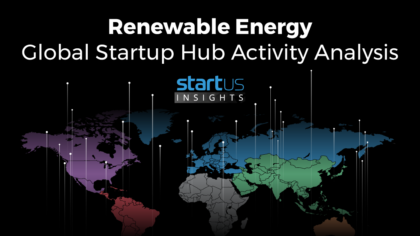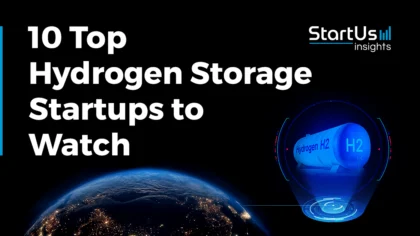The energy utility sector is split into highly complicated business models. Over the last two decades, utilities have tried to find a balance between growing customer demand for cleaner energy, several newish and refurbished coal power plants, keeping their return on investments steady, and the plummeting costs of installing and operating renewable energy. Moreover, renewables do not have any cost of extracting fuel as the wind, the sun, and the earth’s heat are all are free.
Geographic and weather conditions, along with government policies, pose major challenges for the wider adoption of renewable energy. In all this confusion, startups have started offering customers the option of directly buying renewable energy, putting further strain on the existing monopolies of the energy sector.
Top 5 Global Renewable Energy Startup Hubs
Using our Startup Search Engine covering 1.000.000+ startups & emerging companies, we analyzed the geographic distribution of global activity in renewable energy. We identified 25 regional hubs (hub = the regional geographic center of activity for a specific topic; it covers the center point with a radius of 100km) that see high activity in developing these kinds of solutions. According to our data, London, the Greater Silicon Valley area, New York City, Los Angeles, and Boston account for 21% of global activity in this field.
The US and Canada together dominate the renewable energy industry, accounting for almost half the global activity in the field. Over the last two decades, China has subsidized solar and wind energy, developing large scale projects such as a solar farm, shaped like pandas smiling, and a plan to set up panels in space to beam solar energy back to earth. However, despite the investments, both North America and China still use coal for powering more than half of their country.
European hubs like London, Amsterdam, Paris, Berlin, Madrid, and Tel Aviv contributes to more than a third of global activity in this sector. Even here, investments in renewables have stalled over the last few years. India and South-East Asia are all set to increase their dependency on coal and other fossil fuels, despite ambitious government policies looking at the broader implementation of renewable energy.
Across South America, renewable energy like hydroelectricity and bioenergy already contribute significantly to their energy mix. In Africa, where there is an abundance of natural resources for energy, geopolitics and a general lack of coordination between nations means different countries are at different stages of adopting renewable energy.
Let’s have a look at some of the renewable energy startups from the top 5 hubs globally:
#1 London | 147 Startups & Emerging Companies
Advancements in the off-shore wind, ocean, and solar technologies could potentially allow the UK to reduce its imports and drive innovations in renewable energy solutions. Given the constraints in generating power from solar and wind, there is a lot of research being done to find alternative sources of renewable energy.
Deciwatt, a startup from London, has been working for over a decade to develop such a technology. Their product GravityLight, as the name suggests, generates energy to power a lightbulb for 20 minutes by simply pulling on weights. Designed to replace the millions of kerosene lamps being used in the world today, this light requires no battery.
#2 Greater Silicon Valley Area | 139 Startups & Emerging Companies
Home to some of technology’s biggest names, Silicon Valley is also a global innovation hub, having produced several disruptive ideas over many years. The sheer scale of innovations and range of industries operating here allows for robust and disruptive solutions for the future. Experiencing a tremendous increase in building size and number, companies are working towards making sure there is no energy waste while looking for alternative sources to power their buildings.
The need of the hour is to make buildings of all sizes utilize energy from renewable sources. To expect individual action will mean a prolonged dependence on fossil fuels. San Francisco-based startup Station A develops machine learning algorithms to help any building achieve zero carbon emissions. Their eponymous platform provides clean energy developers and energy users with insights by analyzing data from millions of buildings and thousands of utility providers.
#3 New York City | 134 Startups & Emerging Companies
Strengths in advanced manufacturing and robotics, cybersecurity, and health and life sciences subsectors make New York City one of the largest innovation hubs in the world. With high energy requirements, companies are looking to find ways to make buildings efficient while working towards developing alternative power sources. The sheer scale of the city today requires careful redesigning of the power grid.
Heating, Ventilation, and Air Conditioning (HVAC) is an important part of regulating indoor temperature and air quality. Used widely all over the world, many existing HVAC technologies release harmful gases into the atmosphere, adding to pollution. New York City-based startup Gather Energy develops geothermal HVAC solutions for commercial establishments. Using the earth’s heat reduces emissions to zero or to very low levels and does not burn any fossil fuels to heat or cool buildings.
#4 Los Angeles | 88 Startups & Emerging Companies
Los Angeles is filled with environmentally conscious and financially available opportunities, making it a global hub for developing future-looking solutions. In recent times, with extreme degradation of water and the environment, the need for adopting renewable sources has taken priority. Several companies develop innovative sustainable energy solutions for people all over the world.
Vena Water, a startup from Los Angeles, develops technology to create water from the air. Using renewable, cost-effective and scalable technologies, they condense water from the air and pump it to the surface for consumption. Their method has a significantly lower carbon footprint when compared to other atmospheric water generation (AWG) technologies.
#5 Boston | 77 Startups & Emerging Companies
Boston, from the US state of Massachusetts, is mulling over a policy to legislate that the state uses 100% renewable energy sources by 2035. Spurred by the availability of skill and capital, Boston looks set to see increased activity in developing renewable sources of energy.
Lithium-ion batteries are rapidly developing to meet various energy storage targets around the world. However, there are many other energy storage technologies that can achieve higher rates of energy storage. Boston based startup Rheomega develops foam technology to achieve significantly higher energy storage using microturbines and near-isothermal compressed air. They develop the turbine, engine, and compressor using foam technology.
What’s next?
As we can see from these examples, startups are looking at different ways to bring clean energy to the world. Some work with utilities to better distribute and optimize energy while some others directly offer renewables to customers. While shifting to renewable energy is a daunting task for energy utilities, consumers are already reaping the benefits of cheaper installation and operation of solar and wind energy, which has become overall less expensive compared to coal-powered electricity. We may not be too far from large scale smart grids that incorporate all the different energy sources while slowly fading out coal and other fossil fuels.









